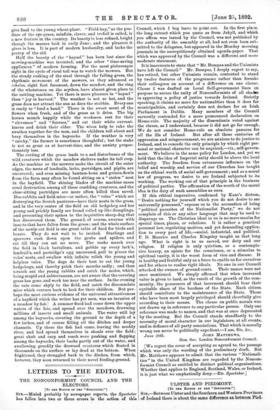LETTERS TO THE EDITOR.
THE NONCONFORMIST COUNCIL AND THE ELECTORS.
[To TES EDITOR OF TER " SPXCTATOR."] Six,—Misled probably by newspaper reports, the Spectator has fallen into two or three errors in the action of this
Council, which I beg leave to point out. In the first place, the long extract which you quote as from Jekyll, and which you affirm was issued by the Council, was not published by the authority of the assembly at all, had not even been sub- mitted to the delegates, but appeared in the Monday morning journals in the surreptitiously obtained agenda-paper. That which was approved by the Council was a different and more moderate statement.
It is inaccurate to state that " Mr. Bompas and the Unionists
have left the Council." Mr. Bompas, I deeply regret to say,. has retired, but other Unionists remain, contented to stand by twelve features of the programme rather than forsake their colleagues on account of a difference on one clause.. Clause 2 was drafted on Local Self-government lines on purpose to secure the unity of Nonconformists of all shades in approving a policy of justice towards Ireland. Strictly speaking, it claims no more for nationalities than it does for municipalities, and certainly does not declare for an Irish Parliament in Dublin. Many members of the Council earnestly contended for a more pronounced declaration on Home-rule. The majority of the dissentients voted against the clause, as I understand, because it did not go far enough. We do not consider Home-rule an absolute panacea for all the ills of Ireland. But after all these centuries of oppression and misgovernment, we are anxious to do justice to Ireland, and to concede the only principle by which right per- sonal or national character can be acquired,—viz., self-govern- ment. We believe in the same policy for London, and yet we hold that the idea of Imperial unity should be above the local authority. The freedom from extraneous influence on the belief and worship and service of our Churches has taught us the ethical worth of social self-government ; and as a moral law of progress, we desire to see Ireland subjected to its working. The working out of that principle is the business of political parties. The affirmation of the worth of the moral idea is the duty of such assemblies as ours.
If this ethical imperative, confirmed by Kant's dictum, "Desire nothing for yourself which you do not desire to see universally possessed," exposes us to the accusation of being " political parasites of the Nationalist Party," we do not complain of this or any other language that may be used to disparage us. The Christian ideal to us is no mere maxim for special times, places, or relations. It is rather a practical personal law, regulating motives, and yet demanding applica- tion to every part of life,—social, industrial, and political. F. D. Maurice and Charles Kingsley taught us that long ago. What is right is to us sacred, our duty and our religion. If religion is only quietism, or a contempla- tive luxury, an opiate for the conscience, or a stimulus to spiritual vanity, it is the worst form of vice and disease. It is healthy and fruitful only as a force to enable us for ourselves and for others to realise right ideals. No one in our Council. attacked the owners of ground-rents. Their names were not once mentioned. We simply affirmed that when increased value is given to land, as the result of the growth of the com- munity, the possessors of that increment should bear their equitable share of the burdens of the State. Each citizen_ should contribute to the maintenance of the State. Those who have been most largely privileged should cheerfully give- according to their means. The clause on public morals was not drawn up in reference to any particular person. Only one reference was made to names, and that was at once deprecated. by the meeting. But the Council stands steadfastly to the necessity of moral character in our legislators, at all events, and in defiance of all party associations. That which is morally wrong can never be politically expedient. —I am, Sir, &c.,
June 20th. JOHN MATTHEWS, Hon. Sec. London Nonconformist Council..
[We regret the error of accepting as agreed to, the passage which was only the wording of the preliminary draft. But Mr. Matthews appears to admit that the various " Nationali- ties " in the United Kingdom are regarded by the Noncon- formist Council as entitled to distinct political organisations.. Whether that applies to England, Scotland, Wales, or Ireland, it is just what we emphatically deny.—En. Spectator.]


































 Previous page
Previous page